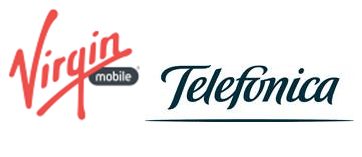After much speculation, Virgin Mobile Latin America (VMLA) announced that it will launch mobile virtual network operator (MVNO) services in Mexico in the next few months. Virgin Mobile Mexico has already begun its business build-out with a focus on sales, marketing and customer service.
The company also confirmed that it will launch operations in Brazil without disclosing when services will be available. Virgin stated that its Brazil operations, its fourth in Latin America, will start as soon as possible following regulatory approvals. It has filed an application with Anatel for its MVNO license.
In both Mexico and Brazil, Virgin will use the local networks of Telefónica while controlling the customer experience. Virgin was expected to launch MVNO services in these two countries after the company started telecom services aimed at young people in Chile in 2012 and Colombia in 2013.
In a statement, Virgin founder and chairman, Richard Branson, said he was excited by Virgin Mobile’s expansion plans in Mexico and Brazil, adding that both markets are ripe for Virgin’s innovative and customer-focused service.
Wi-Fi: Boingo Wireless has been selected as the exclusive Wi-Fi and DAS provider at São Paulo International Airport (GRU), the largest airport in South America, serving more than 35 million passengers annually. Under the agreement, Boingo will design, install and manage advanced Wi-Fi and distributed antenna system networks at the airport. Boingo told RCR Wireless News that it is already providing complimentary Wi-Fi access to all travelers as well as a paid premium Wi-Fi service for travelers who want to use high bandwidth activities like streaming video.
3G up: Brazil ended 2013 with 271.10 million mobile accesses, which represents 136.45 accesses per 100 inhabitants. Vivo led with 28.49% of the market, but TIM was close behind with 27.09%. GSM still accounted for the majority of the lines (58.90%); however, the use of this technology is decreasing as 3G emerges, replacing 2G usage. In total, approximately 1.31 million accesses were LTE.
More Latin American news:
- Empresa de Telecomunicaciones de Bogota (ETB) SA, the city-owned phone company, has no plans to seek a partner or buyout for at least two years as it adds television and mobile service, Bloomberg reported.
- Bolivian state-run telecom operator, Entel, will receive a government investment of nearly U.S.$300 million this year aimed at the deployment of fiber optic infrastructure across the country.
- Brazil’s Anatel will regulate the spectrum band of 71 GHz—76 GHz and 81 GHz—86 GHz, following a request from Telefónica and equipment manufacturers. This band could be used for wireless backhaul, point-to-point communication or machine-to-machine connections.
- ANTEL, Uruguay’s largest telecom provider, has signed an agreement with Aicent, a multi-service IPX network provider of mobile data network services and solutions. The deal aims to interconnect Antel with other mobile service providers around the globe to deliver an enhanced LTE roaming experience.
- América Móvil’s Brazilian wireless unit, Claro, and Brazil-based Bradesco, one of the largest banks in Latin America, have launched m-payment services named Meu Dinheiro Claro. The co-branded initiative was first announced in November 2012.
- Mexican Axtel won the tender to provide commercial Internet service in 40 metropolitan areas in Mexico.
- The Dominican Republic’s telecom regulator, Indotel, announced a U.S.$62 million “national optic fiber network,” aimed at carrying telecom services throughout the country, using broadband technology for wider scope and accessibility.
- Chilean Entel released its fourth quarter results. The company’s total mobile customers reached 11,984,548, up 19% compared to 4Q12. Revenues reached Ch$461.8 billion, a 17% increase compared to 4Q12 (including Ch$35.6 billion from Nextel Perú).
- In Brazil, NEC has granted the contract to build ICT infrastructure for Arena das Dunas, located in Natal (RN), one of the stadiums that will host the World Cup this year.


